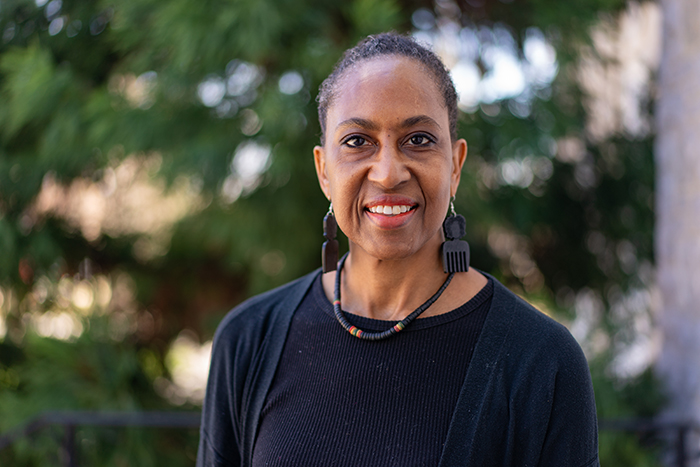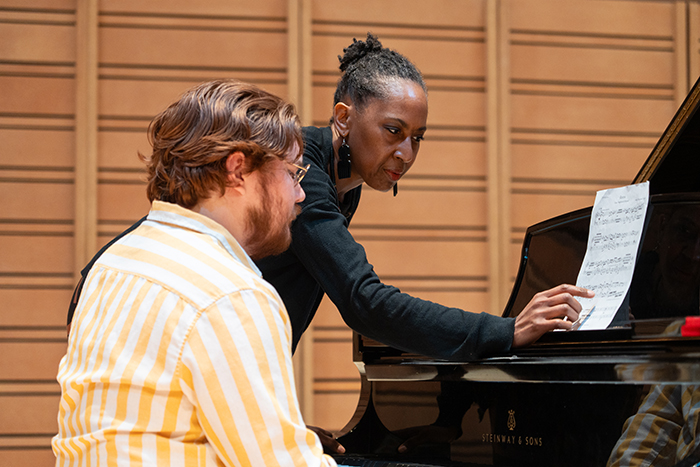Composer, Students Collaborate on 'Silence Optional' Concert

Composer, arranger and pianist Maria Corley completes an in-depth residency at Dickinson this year. You can view her work during an April 5 concert. Photo by Dan Loh.
Works by Maria Corley highlighted in neurodiversity-friendly event
By MaryAlice Bitts-Jackson
There was a buzz in air as Dickinson’s music department prepared for the arrival of up-and-coming composer Maria Corley. To the artist-in-residence’s surprise and delight, students welcomed their distinguished guest with a round of spontaneous applause. For the composer, it was a window into what it might feel like to be a rock star in the making.
Which, in the world of contemporary classical music, she is.
“We’re definitely excited to have her on campus,” affirms Assistant Professor of Music James Martin, who partnered with Corley on a January recital and eagerly anticipates the on-campus concert of her work. “She’s garnering a lot of attention these days, which is rare for a woman of color in classical music.”
After working closely with the composer, Dickinson student and faculty musicians will present a concert of Corley's works on April 5. It’s a chance to hear new works by a noted contemporary composer—and in a format that’s welcoming to audience members who don’t often have the opportunity to enjoy classical music.
Accolades and co
Noted for eloquent piano and chamber compositions and for her singular arrangements of traditional spirituals, Corley is also a world-renowned instrumentalist who holds a doctorate in piano from Juilliard. She’s performed in the U.S., Central America, the Caribbean, Bermuda and Europe and has collaborated with Grammy- and Juno Award-winning musicians, orchestras and orchestra members. Solo performance venues include the Smithsonian Museum of African American History, Liszt Academy, Weill Hall and the Epidaurus Festival.
Though born in Jamaica and raised in Canada, Corley now resides in nearby Lancaster, Pa. That allows her to complete an extended residency at Dickinson, traveling to campus to connect with students and faculty throughout the course of several months.
Rare opportunities

Photo by Dan Loh.
Corley’s residency began in January, when she and Martin presented a joint recital of traditional spirituals she’d arranged. A masterclass with student musicians followed, and each student received one of Corley’s compositions to study. Corley’s since been working with the performers in small chamber groups, as they prepare the works for the April 5 performance (Rubendall Recital Hall, 7 p.m.).
"I appreciated how the masterclass felt more like a collaboration, rather than instruction," says Peter Kohart '24, a geosciences major with a minor in music, focusing on trombone. "It has been amazing working with Maria and our faculty to bring her piece to life."
Carys Chase Mayoral ’26, a double major in vocal performance and physics, has been practicing a vocal piece from one of Corley’s song cycles. She’s also working on two of Corley's compositions for the April 5 concert, as a member of Dickinson’s choir. “I'm very grateful for the opportunity to work with the composer,” Chase-Mayoral says. “It's not often that we get to interact with those who wrote the music we're working on. It's very cool to hear her input.”
Empathy in action
In addition to her musical career, Corley is a published author and poet and a mother of two, one of whom has autism spectrum disorder. In the past, Corley has designed performances with the needs of sensitive listeners, like her son, in mind, writing work that is shorter than the typical classical runtime and presenting it alongside visual elements. Audience members are not shamed for moving a bit or making noise, allowing the beauty of classical music to be more accessible to people like her son, who would otherwise only get to see his mom in rehearsal.
The Dickinson concert will also be a "silence optional" concert, says Corley, in the sense that it will include short pieces "that allow audience members who can't be completely silent to perhaps talk quietly to themselves, as my son does, or fidget or even move around," says Corley
That inclusive and thoughtful spirit underlies the composer’s generous interactions with Dickinson students, says Martin. It also gets straight to the heart of the essential role the arts play in society, notes Jennifer Blyth, professor of music, as the Dickinsonians who perform Corley’s work—and the audience members who take in the performance—accept the opportunity to experience their worlds in new ways.
“Having our students and faculty stand in the shoes of a composer, a living composer, and interpret and represent her voice to the public is, ultimately, an act of empathy, and it upholds our values of inclusion in very real and active ways,” Blyth says. “I promise that for both the performers and the audience there will be moments in this concert that decenter us, that move us—so that we land back in just a slightly different place to understand our world.”
TAKE THE NEXT STEPS
Published March 28, 2024